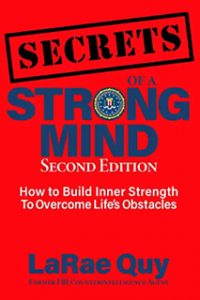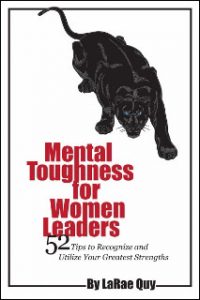My grandmother was a tough old bird. She lived in a time and place where she needed to be resilient if she expected to survive tough winters on a Wyoming cattle ranch. If I moped around while doing chores she would yell, “Get the lead out of your ass and start moving!”
She learned at an early age to value her skills and talents because she knew she’d need them again. Most likely in the near future. Taking personal responsibility for her contributions was not boasting. Instead, it was learning how to survive and be resilient.
Resilience is a component of mental toughness. It is the ability to cope with adversity and obstacles. It comes from believing in yourself, and more importantly, in something bigger than yourself.
While certain experiences in life may make some individuals more resilient than others, resilience isn’t a personality trait that only some possess. Rather, it involves thoughts, behavior, and emotions that anyone can learn and develop.
Let’s look at ways to build resilience when life isn’t perfect:
1. Train Your Brain To Be Resilient
Our brain is constantly rewiring and updating itself based on past experiences; based on this information, it then projects future expectations. Research has shown there are brain proteins and growth factors that endow us with natural resilience. They act as a kind of brain fertilizer that enhances our brain connectivity.
Yes, some people have won the genetic sweepstakes and are naturally resilient and mentally tough. For the rest of us mere mortals, it takes a few knocks before we learn the areas where we need to toughen up.
Self-control and healthy behaviors can be encouraged with an intervention as simple as mindfulness training. It involves attention control, emotion regulation, and an increased self-awareness—all of which increases brain connectivity.
How To Make It Work For You: While not everyone is endowed with the brain proteins needed for natural resilience, scientific studies show that physical exercise and social support help increase certain growth factors.
You can fortify your brain through exercise, mindfulness training, and solid support systems. Don’t wait until a crisis smacks you in the face; strong relationships take time and effort to develop. Find a way to care for others because being selfless is the best way to discover your biggest strength.
2. Focus On What You Can Control

Resilient people are always asking this question: what can I do to change my situation?
I watched as my Grandmother’s cranky horse stretched out his neck and bared his teeth. It bit down on her left breast so hard that she had to have a mastectomy. But she was resilient—she knew while she couldn’t control everything that came her way, she could absolutely control her response to it.
And that changes everything.
My grandmother continued to ride the mare for the next several years and took care of her as she aged and eventually died.
Positive thinkers believe they can control important events in their life, even if slapped with adversity or setbacks. In his book, The Status Syndrome: How Social Standing Affects Our Health and Longevity, Michael Marmot explains how clerks and secretaries are more likely to die of heart attacks than senior executives. He even took into consideration other variables such as smoking and poor nutrition.
But his research team concluded that those in lower category jobs had less control over their life. And that is why they were more likely to suffer from heart disease.
How To Make It Work For You: Don’t expect life to get easier for you. That’s nothing more than wishful thinking. Instead, get stronger with each failure or obstacle that shows its ugly face. You become wiser when you realize that life is not what happens to you but what happens within you.
3. Take Responsibility For Your Own Success
When I was about 8-years-old, I was given a tall black quarter horse to ride. The only way I could get on him was to lead him to a rock high enough that I could step into the stirrup. Horses are not stupid. It didn’t take him long to catch on and he started shying away from the rock.
I would cry in frustration as everyone left me alone to deal with my problem. Although my Grandmother never graduated from high school, she asked me an incredibly wise question: Why did I keep doing the same thing over and over even when it didn’t work?
She was right. I had a self-limiting belief about what I could, and could not, do. The next time I grabbed the leather ties hanging from the pommel of the stock saddle, pulled myself into the stirrup, and then swung myself into the saddle seat.
How To Make This Work For You:
- List three things in your life you would like to change.
- List steps taken in the past to make these changes.
- Why do you think you were unsuccessful?
- Identify a self-limiting belief you have about yourself?
- Are there steps you can take to change this self-limiting belief?
- What obstacles might interfere with these steps?
- Do you have a backup plan?
4. Find Your Zone of Competence

As a child, I needed to learn acceptance, not narcissism, was the path toward a resilient mindset that accepted ownership for my achievements.
Once I was able to claim ownership for my zones of competence, it didn’t hurt so badly to let go of those areas in which I was not as competent. My confidence was not shaken when I was asked to drop my high school choir class because I sang so off-key it was disturbing to those around me!
If we think that chance or luck is responsible for our achievements, then we march through life believing we have no control over our destiny. When things fall to shit around us, we don’t have the mental toughness or resilience to pick ourselves up and tackle the obstacle from another direction. In short, we develop a victim mentality.
Once we realize that we are responsible for our success, we also experience more satisfaction when we do attain our goals. Resilient people believe that problems can be solved, the solutions must be found within themselves, and success is not about self-glorification.
How To Make It Work For You: Resilient people search for meaning. You must believe in yourself. Listen to that still, small voice within you that is full of heart and wisdom and is able to give you a clear sense of purpose.
© 2021 LaRae Quy. All rights reserved.
You can follow me on Twitter, Facebook, Instagram, AND LinkedIn
Are you mentally tough? Here is my FREE Mental Toughness Assessment
Check out my new online training program at www.SecretsOfAStrongMind.com
Get my new book, “Secrets of a Strong Mind (second edition): How To Build Inner Strength To Overcome Life’s Obstacles”

Author of “Mental Toughness for Women Leaders: 52 Tips To Recognize and Utilize Your Greatest Strengths”



Another great and inspiring post LaRae! I can get caught up in my self-limiting beliefs. The way I have learned to work around them is to remind myself of the successes and how I worked hard to score them. Those situations continue to guide me to take more risks and self-promote the areas I am strong in. Resilience is key to survival especially when we are having a challenging blip in our lives.